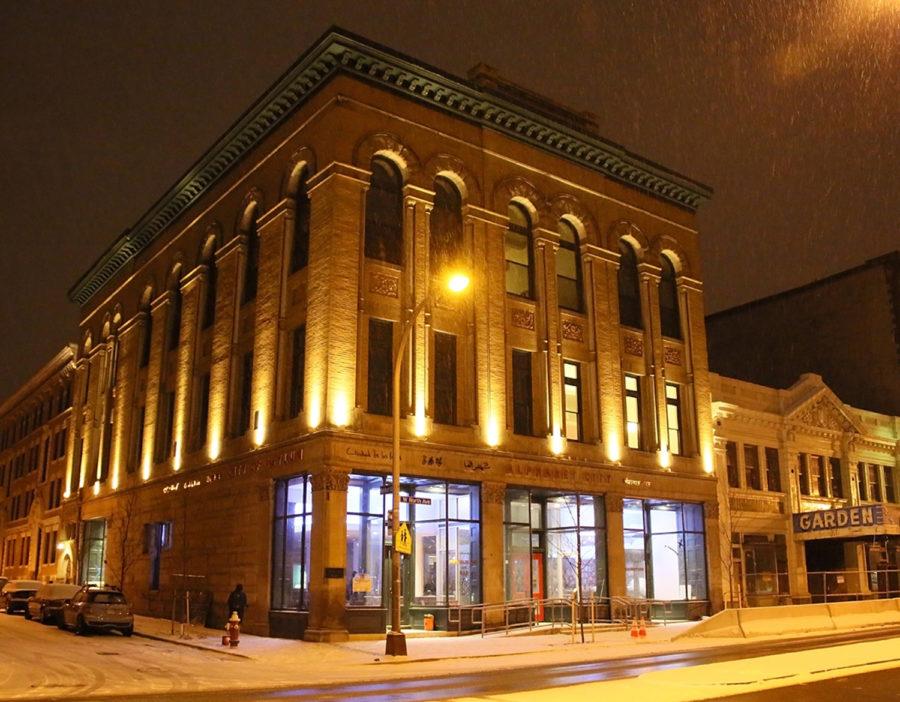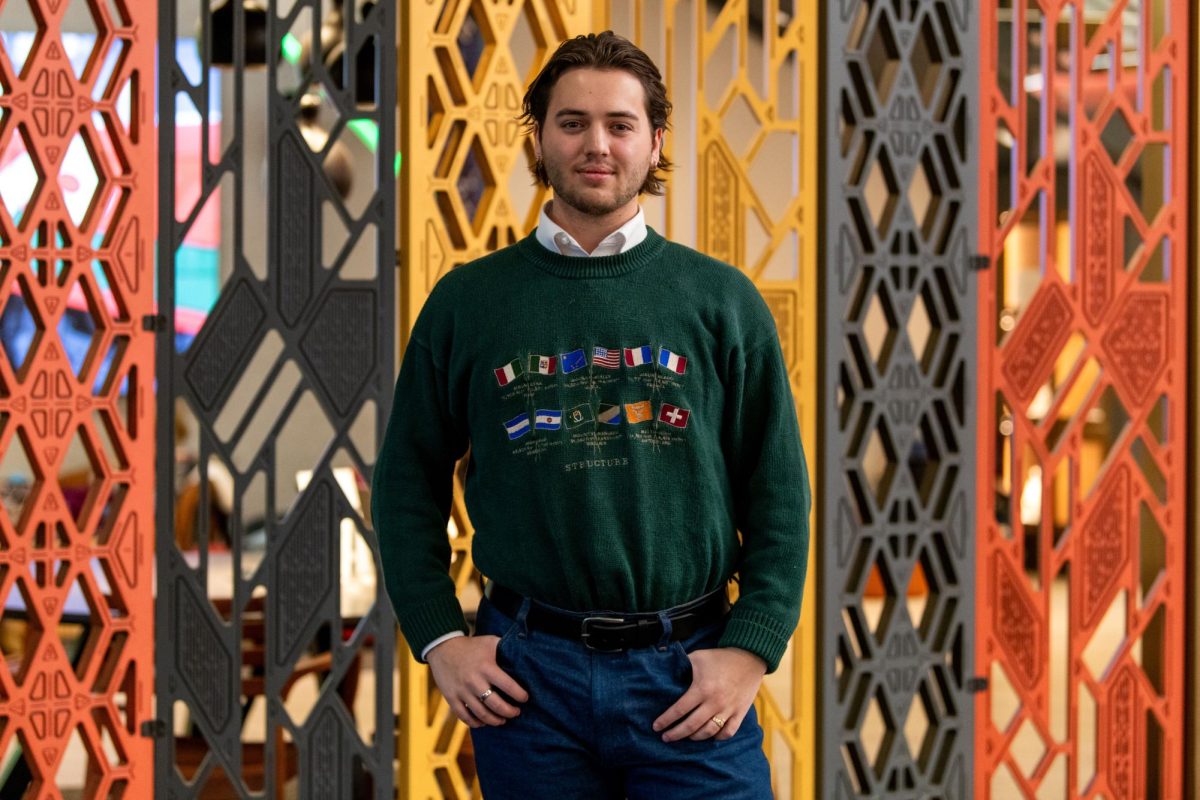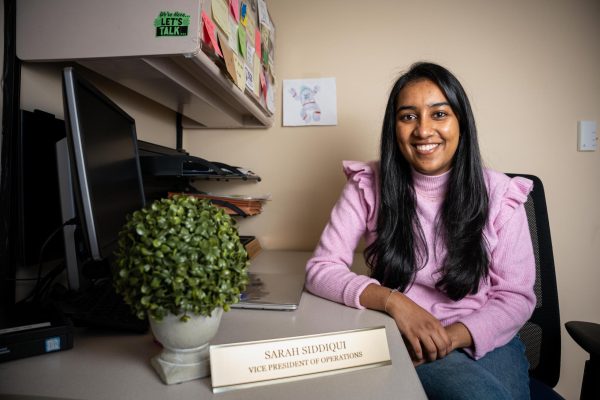City of Asylum wraps 14th annual Jazz Poetry Month, welcomes new changes
Photo courtesy of City of Asylum
City of Asylum is a bookstore that specializes in translation and world literature but also hosts events like Jazz Poetry, which combines two art forms.
October 2, 2018
Jazz Poetry Month at City of Asylum wrapped up this weekend with inventive performances by jazz musicians Jaimeo Brown, Chris Scholar and Jaleel Shaw at Alphabet City — the inventive new home of City of Asylum.
City of Asylum, Pittsburgh’s hub for international literary works and persecuted writers seeking refuge, has undergone a few changes in the past year and a half. Most strikingly, the nonprofit organization moved into its new space on the North Side. Alphabet City is split up between a bookstore, a restaurant and a reading lounge that transforms into a stage and performance area at night. Events often held here include film series, jazz concerts and poetry readings.
In the month of September, jazz and poetry are combined for City of Asylum’s signature event — Jazz Poetry Month. Every year since 2004, City of Asylum has held many events combining the two art forms.
This year, there are some new additions. For one, the events are being live-streamed via Facebook. Senior project manager Karla Lamb was especially excited about this addition.
“Facebook is such a good tool to reach an international audience, and if the artist wants to tell their friends and family that can’t be here, they can share that experience with them,” Lamb said.
Technology has enhanced its year-round events in other ways, too. With projections translated into English on the stage and a beta-phase app that could translate an event directly to your headphones, much of the new additions to City of Asylum are based on inclusivity.
“How often do you get to go to a poetry reading where … you’re hearing Arabic, Bengali, Spanish, and you get to experience it in the language that the poem or the story originated in?” Lamb said.
Another new addition this year is the children’s programming. A youth author series is being held in conjunction with the bookstore to bring in a younger crowd, since right now most returning visitors are a loyal, yet older demographic. Rebecca Martin, the project coordinator, described how City of Asylum does more than just Jazz Poetry Month in September — and how they plan to expand their reach in the future.
“Things are different. We’re still kind of figuring out what future programming will look like, including [our magazine that is on hiatus right now] and things like that,” Martin said. “We have several film series and we work with local jazz artists all the time.”
Martin is one of several new staff members. Many of the staff members — both old and new — refer to the history of the organization through three separate eras, from “in the alley” to “the tent” to “Alphabet City.”
The alley they refer to is Sampsonia Way, located in the historic Mexican War Streets district of the North Side. This alley is home to a row of houses where City of Asylum’s writers-in-residence stay. During Jazz Poetry Month, international jazz musicians and poets who fly in for a few shows will stay here. It’s Martin’s job to prepare these houses for them.
The houses are unlike most others in this district — aside from Randyland, perhaps. They have been drawn and painted over by some of the artists that lived there.
The first artist to do so was Xiang Huang, a Chinese poet and City of Asylum’s first writer-in-residence. Jazz Poetry Month’s first-ever event was created because of the curiosity some residents had about his work.
Huang does not speak English and is deaf because of torture he endured in prison. None of this stopped him from painting his poems in calligraphy on the outside of his house on Sampsonia Way in 2004. Henry Reese, co-founder of Pittsburgh’s City of Asylum, saw the solution — combine Huang’s poetry, potentially completely unintelligible to a Pittsburgh audience, with Oliver Lake’s jazz music.
Lake was based in California at the time, but that didn’t deter Reese from making the call and inviting him on a whim. Lake said yes, and the first Jazz Poetry event was held right outside his house. About 40 chairs were set up in the street, a far cry from the building where today’s performances are held. To Reese’s partial surprise, the event was well-received.
Lamb looked back into the history of the poetry event and described Lake’s passion for the poetry and the music.
“He has a poem called ‘lion’ where he’s literally roaring. As part of the poem, he’s rolling around on the ground, he’s in your face, he’s touching noses — there’s videos of it, too. So Oliver was just able to pick up on that vibe and interpret that through jazz. I don’t know how they did it,” she said.
According to staff, this story is Huang’s “lasting legacy,” even though he was a City of Asylum writer-in-residence for a full two years.
Huang returned last year to collaborate again with Lake. Lake has returned every year for the past 13 years that the event has been held, including this past weekend.
City of Asylum’s Jazz Poetry Month began as a pop-up in front of Huang’s house poem and moved through several different-sized tents in multiple North Side locations before settling into its potential permanent home in Alphabet City.
The space is also shared with the restaurant Brugge on North and the City of Asylum’s eponymous yet separately managed bookstore. During Jazz Poetry events, people dining at Brugge can listen and enjoy the event for free.
Leslie Rains, the bookstore manager, said the bookstore has seen more traffic with the new restaurant as well — which, in turn, helps spread the City of Asylum message.
“We want to bring in underrepresented voices, promote cross-cultural exchange, promote internationalism and the freedom of expression,” Rains said.
Lamb echoed this idea that all are welcome to enjoy the message of City of Asylum. She pointed out the foreign alphabets that cover the walls inside of Alphabet City — painted on the ceiling, sandblasted on the large glass windows, stenciled on the walls of the restaurant — and, of course, found inside the many translated international books in the bookstore.
“It’s the message of one human experience, which again amplifies the message of freedom of speech and freedom of expression. Because it’s the letters, the stories and the arts that bring us together.”








